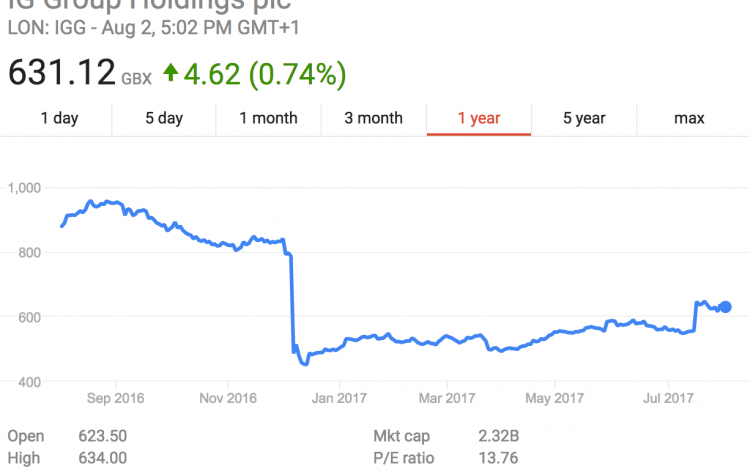Stocks of FX Brokers are showing buying signals

During December 2016, most of the listed Forex brokers have experienced a heavy hit on their share price. The main reason behind a huge slump in the value of FX and CFD brokers was the regulatory changes, and these changes have not brought anything positive to the retail FX industry. Firstly, CySEC has announced that it requires the brokers to stop offering various trading benefits. Secondly, many other regulators followed up with similar practices, while FCA has announced that it might require the brokers to cap the leverage to 50:1. All of these announcements have resulted in a dramatic price fall.
One of the world’s largest brokers, IG Group Holdings plc, has declined in its value from nearly a 1,000 GBP per share in September to 450 GBP per share in January.

World’s largest non-Japanese broker, FXCM, has experienced an even larger decline in its share price due to its misconduct in the US.

And one of the most innovative FX brokers, plus500, demonstrates a steady growth this year after its price has fallen in 2016.

To predict the direction of the future share price of FX brokers we have to answer a few questions.
What happens with retail FX?
Currently, the whole market is in the period of uncertainty. Nobody knows what else is to be expected from the European regulators. Perhaps there will be more actions taken to regulate the affiliates, various websites that supply trading education, Forex signals, broker ratings and more. It is possible to see that CySEC has already requested the brokers to conduct a better KYC of its affiliates and approve their means of advertising. Yet we see that there has been little action taken for now, but the majority of the brokers are growing in their value. Hence, the overall market sentiment is quite positive.
Are there any opportunities?
You may love or hate Trump, but one thing here is for certain – there is a chance Trump will open up retail FX market for foreign brokers. And if this happens, it might have a huge positive effect on the whole industry. This is, perhaps, the only positive thing that could have happened to the FX industry. Having said this, it is possible to expect huge fines, large capital requirements and local presence from the brokers that could be allowed to operate in the US. As a result, only the largest FX brokers might actually profit from this.
How about technology?
Speaking of the IT in the FX sector, it is clear that the speed of the software development has become much slower. While there were many companies that wanted to make a better version of MetaTrader and these companies were taking a larger share of the exhibition floor at various FX expos, today we see that all of the technology companies in the FX sector started looking elsewhere for the opportunities. Now most of the software providers in FX are dealing with the CRM, payments, reporting and other challenges. Nevertheless, Forex still remains the most technologically advanced market and it is unlikely to be overtaken anytime soon.
Should you invest at all, and if yes, what’s the best buy?
Today the stocks of the majority of the FX companies are very low and, most importantly, all of the regulatory changes have been included in the price. While it’s clear that there are a few listed brokers that experience quite some troubles, the largest players in the industry are expected to get their stock price back to what it used to be before SNB event.
We are not going to give a strong buying signal on a certain stock, yet acquiring shares of the largest European brokers that hold a number of licenses does seem like a good idea.


























Comments (0 comment(s))